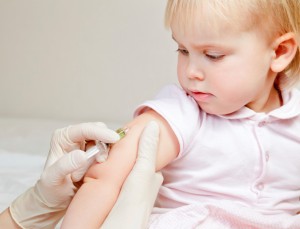As of 2014, it was reported that one in every sixty-eight children is affected by autism in America. Because this disease affects so many American children, there is a high budget for research in order to become more informed on the disease as well as find possible links to its cause and determine solutions to the problem. One of the more commonly associated thoughts with autism is whether or not vaccinations have any correlation to the development of the disease. Because of this, many studies are conducted to see whether this link between vaccinations and autism has any merit. Thanks to the research conducted by scientists, vaccinations and autism are correlated in some ways. However, we know from class that correlation does not always equal causation, so more in-depth studies need to be conducted in order to find out whether or not this could be a possibility.
This issue makes me wonder if vaccinations have a direct relationship to causing autism. In that case, people should stop getting vaccinations altogether.
Third confounding variables also need to be taken into consideration because maybe something like the metals in needles used to administer the vaccinations is actually causing the autism. As Andrew has stated in class, “chance is lurking everywhere,” so we can never count that out. In this case, reverse causation would be ruled out because there is no logical way that autism could be the thing causing you to receive vaccinations because of the passage of time.
Evidence
In a study conducted in 2011, scientists administered an experiment where they tested eight commonly given vaccines to adults and children to see if they had any cause in the development of autism. They were able to conclude that these eight vaccinations were very safe aside from the extremely rare cases. This experiment could be morally wrong if it was administered another way. If scientists and doctors went around vaccinating people with multiple medications and seeing if they develop autism, they could get themselves into a lot of trouble. Just like we discussed in class, in a situation where a doctor wants to operate an experimental treatment, consent needs to be provided.
Another case-control study examined the amount of the ingredients found in vaccines given during the first two years of life which help the body to produce disease-fighting antibodies (antigens) and compared it to the levels found in children with and without autism. The null hypothesis, in this case, would state that there is no difference between the levels of disease-fighting antibodies in children with or without autism except chance.  The alternate hypothesis would state that there is a palpable difference seen between the levels of these antigens in children with or without autism. With a control group of 752 children without autism and 256 with autism, this study was relatively small compared to a large number of children who suffer from autism.
The alternate hypothesis would state that there is a palpable difference seen between the levels of these antigens in children with or without autism. With a control group of 752 children without autism and 256 with autism, this study was relatively small compared to a large number of children who suffer from autism.
To improve this study, I feel that researchers could a study of a larger scale of children to help reinforce the data that was discovered. The results, however, showed that the level of antigens was equal in children with or without autism. Thanks to some of these studies, scientists are able to conclude and reassure people that the vaccines do not actually cause autism.
Although parents and scientists alike continue to develop new hypotheses linking autism and vaccinations, science continually disproved them with thorough examinations of these theories. The most commonly proposed hypotheses can be read about here as well as the results of the many experiments conducted to disprove these hypotheses. As long as children continue to develop autism, parents and doctors will also continue to develop theories on why this occurs. Thanks to the rigorous experiments conducted in many labs around the world, autism being caused by vaccinations should be taken off the list of concerns because there is valid proof found which disproves the hypotheses.
Final thoughts
What we can take away from all of this is that parents shouldn’t worry about vaccinating their young children. With all of the information and evidence science has given us, there is no need for concern.  Doctors and researchers do the very best that they can to make sure they are keeping a patients or parents best interests in mind while they are doing their job. Thankfully, there is science to back up their notions and disprove the fact that vaccinations may cause autism.
Doctors and researchers do the very best that they can to make sure they are keeping a patients or parents best interests in mind while they are doing their job. Thankfully, there is science to back up their notions and disprove the fact that vaccinations may cause autism.
Additional sources:
http://www.cdc.gov/vaccinesafety/concerns/autism.html
http://www.webmd.com/brain/autism/searching-for-answers/vaccines-autism


I think this is an interesting article because it’s not just tied to science but also politics. With the recent rise of the anti-vaccination movement, this issue is as prevalent as ever. People behind the anti-vaccination movement cite this very theory, that autism causes vaccines, as one of its chief reasons for being against vaccines. Unfortunately for them, the science in your post seems to suggest that autism and vaccines are not linked like people believe. In this article (http://phenomena.nationalgeographic.com/2015/07/02/measles-death-us/), it was reported that in the United States someone died measles for the first time in twelve years. This is clearly linked to the refusal of some to give their children vaccines, and it’s sad that some people let their mistaken beliefs about the relationship between autism and vaccines get in the way of public safety.